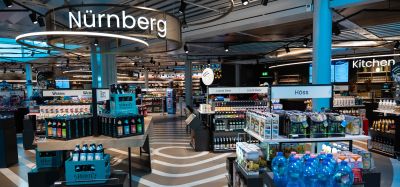The cost of one bag
- Like
- Digg
- Del
- Tumblr
- VKontakte
- Buffer
- Love This
- Odnoklassniki
- Meneame
- Blogger
- Amazon
- Yahoo Mail
- Gmail
- AOL
- Newsvine
- HackerNews
- Evernote
- MySpace
- Mail.ru
- Viadeo
- Line
- Comments
- Yummly
- SMS
- Viber
- Telegram
- Subscribe
- Skype
- Facebook Messenger
- Kakao
- LiveJournal
- Yammer
- Edgar
- Fintel
- Mix
- Instapaper
- Copy Link
Posted: 11 April 2011 | Keith Spinks, Secretary General, European Travel Retail Council | No comments yet
The flying public have experienced huge changes in the air travel experience over the course of the last two decades. Most of those changes have been beneficial and welcomed by passengers such as improved facilities and lower prices. Other changes have been less accommodating, such as the introduction of charges for checking in luggage.
The introduction of these charges has proved very lucrative for airlines, particularly low cost carriers. By unbundling the travelling experience and charging for each constituent part, low cost carriers can offer headline lowcost fares and supplement their revenues with the additional charges.
The flying public have experienced huge changes in the air travel experience over the course of the last two decades. Most of those changes have been beneficial and welcomed by passengers such as improved facilities and lower prices. Other changes have been less accommodating, such as the introduction of charges for checking in luggage.
The introduction of these charges has proved very lucrative for airlines, particularly low cost carriers. By unbundling the travelling experience and charging for each constituent part, low cost carriers can offer headline lowcost fares and supplement their revenues with the additional charges.
Passengers however are always seeking to get the most value out of their money, and in order to avoid the fees to check in baggage, passengers now carry more and more hand baggage. In response to this development a number of low cost carriers have begun enforcing a strict one carry-on bag policy for passengers. The airlines ‘fine’ passengers who bring additional baggage beyond the one piece they are allowed. Unfortunately some airlines are including airport shopping in their policy, a time honoured part of the travel experience, and certainly not part of the hand baggage congestion problem.
The one bag policy ignores established practice and custom associated with air travel. Passengers have been allowed to bring duty free and travel retail on board planes since commercial aviation began. This practice has allowed the development of the global duty free industry, worth some €30 billion now in annual revenues. Shopping at the airport has been an integral part of the travel experience, and such purchases have a marginal effect upon onboard luggage capacity.
This latest move by certain low cost carriers is an area of concern not just for passengers. The one bag policy has a chilling effect on airport retail as passengers will not purchase items that do not fit into their permitted hand baggage. In airports where the policy is strictly enforced retail outlets have recorded a drop of up to 40% in sales.
The introduction and the enforcement of the one bag policy by selected low cost airlines bring into question the relationship between airport operators and airlines. In many cases, particularly in regional airports, charges are reduced or waived entirely as the passengers they bring through the terminal doors present opportunities for airport retail to generate revenue.
Refusal to allow passengers to bring travel retail purchases onboard (unless it fits into their one piece of hand luggage) breaks this model as passengers are reluctant to spend money at airport retail outlets for fear of being fined when they board the plane.
The one bag policy is a win-win for low cost carriers. On the one hand it generates revenue for them through the imposition of fines. News reports from the United Kingdom show how gate staff are required to fine six passengers per flight or face disciplinary action. With a €35 fine levied against each of the passengers, it quickly adds up to be a very lucrative – and low cost – revenue stream for low cost carriers.
On the other hand it helps drive in-flight sales. Low cost carriers are increasingly seeking to compete with airport retail outlets. By restricting passengers from purchasing items at the airport, and offering similar products as part of their own in-flight service, low cost carriers are effectively re-directing sales away from the airports.
Although it is win-win for the airlines, it is lose-lose for the passengers and the airports. The passengers are punished for carrying items beyond the allowed one piece of cabin baggage. They are denied the consumer choice of where to buy products as part of their journey. Unable to purchase at airport retail, passengers are instead limited to the products available as part of the in-flight service. The passenger is denied the extensive range carried at airport retail.
For those passengers who run foul of the one bag policy, they are required to pay a fine, or throw away the product that they have bought. Such passengers have no recourse and nowhere to turn to.
The airports also suffer as they are deprived of significant and important revenue. The travel retail industry is worth more than €10 billion per annum in Europe. In many cases airports can earn more than 50% their total commercial revenue from duty free and travel retail. This revenue stream allows them to bring down costs for airlines and passengers alike and, most importantly, to finance infrastructure developments and expansion.
Modern planning of airports places particular emphasis on creating spaces where passengers are comfortable and where retail opportunities can be maximised. This important revenue stream is now under threat. Future infrastructure developments and investment are now at risk as a result of the uncertain future.
Just as the adoption of the one bag policy represents a progression from the imposition of charges on the checking in of baggage, so too is there an example of the next step in the process. In the United Sates, Spirit Airlines, allows only a lady’s handbag or a small backpack to be brought onboard free of charge. Larger items must be stored in the overhead lockers, and each such item is charged up to $45.
This has had a serious impact and effectively ended airport shopping for Spirit Airlines passengers. Could this be the next step for carriers in Europe and elsewhere?
The introduction of the one bag policy by low cost airlines demonstrates the power that airlines now possess to shape the market with consequences for passengers and other industries. Their dominant position within the industry puts them in a position to dictate the terms by which others do business with them. Without strong industry to stand up to them, passengers will continue to suffer, and the model which has led to the growth of strong European airports and a strong European duty free and travel retail industry, will be irreparably weakened.
It is in the interest of airport operators to encourage and facilitate retail activity at their airports, to respond to the low cost carriers enforcing the one bag policy, and to protect a crucial revenue source that is fundamental to operations and future development.
The European Travel Retail Council – A history
1988
The Council was first established in 1988 as the International Duty Free Confederation (IDFC), when leading industry figures recognised that the then intra-EU duty free trade was threatened by draft Community tax legislation being proposed as part of the package of laws necessary to bring about the creation of the then European Economic Community’s (the forerunner to the European Union, the EU) ‘Single Market’ on 1st January 1993.
The EU Commission reasoning for the proposed abolition of intra-EU tax and duty free sales at the time was that, since fiscal frontiers between EU Member States were being abolished, as were customs controls, and as the concept of import and export therefore no longer applied within the EU, there was no valid reason to allow tax and duty free sales to continue in what was described at the time as a single EU domestic market.
The IDFC, together with its various national duty free trade associations that had been formed across the Community, lobbied strongly against this proposal at the Commission, European Parliament and with national governments. It argued that the tax and duty free trade was consistent with the principles of a ‘Single Market’. The industry would contribute to the goal of establishing the four freedoms of movement within the EU, of people, goods, services and capital, that were to become enshrined as the cornerstones of the post 1992 Community.
Following a concerted campaign at the European Parliament and with national governments, the industry succeeded in convincing the EU’s Council of Finance Ministers (ECOFIN) that to abolish the trade at that stage in the Community’s development would bring benefits to no one and would seriously damage a viable and valuable part of the Community’s economy.
In November 1991, the Ministers agreed unanimously (as all decisions on taxation issues require unanimity in Council) to an extension for the intra-EU tax and duty free trade of six and a half years, until 30th June 1999.
Although a major success for the industry, the argument that the intra-EU trade was consistent with the principles of the European Community’s ‘Single Market’ had not, however, been accepted.
The Ultimate Campaign
With the advent of the ‘Single Market’ in 1993, the duty free industry initially focused on developing ‘vendor control’ regimes that were to the satisfaction of the national customs authorities.
However, in 1994, the IDFC Board decided that, as there were no apparent viable alternatives to the existing tax and duty free business within the EU, the trade must once again fight for its survival.
This time, the campaign would be much more challenging as the industry would be seeking to amend current law (the extension of intra-EU tax and duty free sales until 30th June 1999 was included in EU legislation on both the VAT and excise duty regimes), not opposing the implementation of planned legislation, as was the case in 1992. And once again, unanimity within the Council of Finance Ministers (ECOFIN) was the ultimate goal.
Substantially greater resources than those available in the late 80’s, early 90’s, both in terms of manpower and finance, would be required this time and the industry once again rallied to the IDFC’s appeal. This led to the creation of two separate but allied organisations: the European Travel Research Foundation (ETRF), responsible for developing the necessary research data to support the industry’s political lobby, and Focus 99, providing the funding and coordinating the trade’s media and public relations activities.
With the information supplied by the ETRF (convincing research data, produced independently, on the implications of abolition for jobs, increasing travel costs, etc., both for the trade and the travelling consumer), together with the professional media campaign planning and support provided by Focus 99, the IDFC took on a Commission that was determined to see the implementation of the 1992 legislation and the abolition of tax and duty free sales within the EU.
A Brussels based team of six political lobbying and PR specialists, supported by a dedicated group of public affairs experts from within the duty free industry, undertook what was to be later described by many EU-lobby experts as probably the most professional industry campaign ever undertaken within the EU.
At a local level, the national associations were being successful in convincing many EU Member State’s governments that the demise of intra-EU duty free was not necessary, both commercially and politically.
Even the European Parliament did not accept the Commission’s arguments and in 1998, at a plenary session in Strasbourg, unanimously (for the first time in its history) voted to call on the EU Commission to undertake a detailed study into the consequences of the elimination of intra-EU duty free, before any final decision was taken on abolition. The Commission ultimately ignored this demand.
Indeed, the issue of duty free abolition became so politically important in many countries that Prime Ministers became involved in the policy making process, not just Finance Ministers, and, in early 1999, it looked possible that there was sufficient support that a further extension beyond mid-1999 was on the cards.
However, external politics were to intervene when, at a meeting of the Heads of Government in April 1999, anticipated to agree an extension for the industry of a further five years, a returning senior EU diplomat from the war ravaged region of Kosovo was asked to brief the meeting on the latest situation in the region and the duty free issue was dropped from the agenda due to lack of time. The next opportunity for discussion on the duty free question was the final meeting of the Heads of Government under the German Presidency of the EU in Cologne on 4th June 1999, less than one month from the ultimate deadline.
Post 1999
The EU ‘Single Market’ may have been in place since 1993, but one thing was certain; there was no single market where indirect taxation (VAT and excise duties) was concerned. With tax policy remaining the remit of national governments, there was little likelihood of further harmonisation of VAT and excise duty rates across the EU.
Therefore, there were still interesting tax induced price differentials for consumers travelling by sea and air within the EU, from high taxed countries, principally in the north of Europe, to mainly lower taxed holiday destinations in the south.
With differences on VAT ranging from 15% to 25%, and with excise duties on tobacco and alcohol beverages in the lowest taxed countries being one third of the level in the highest, there emerged a valuable trade in duty paid retailing to travellers moving within the EU, or ‘travel retail’ as it became known.
Some operators decided to further strengthen the retail offer to consumers by introducing a ‘one price’ policy, regardless of the traveller’s destination, (with the exception of tobacco and, in some cases alcohol).
However, within the EU, the original 1992 legislation that foresaw the abolition of intra-EU tax and duty free sales did not envisage the evolution of retailing to travellers moving within the EU by sea and air, across fiscal borders and between Member States.
Therefore, even though there was a growing demand from consumers to continue buying in this unique environment, the legal systems in place restricted the ability of the trade to fulfil this demand, particularly for those companies operating mobile shops, such as airlines and the ferry companies.
To address these problems, and with the expansion of the EU to include many new members countries in 2004 and beyond, it was agreed in early 2000 to create the International Travel Retail Confederation (ITRC) from the remains of the former IDFC.
The ITRC
During the 4 years from 2000, the ITRC managed a number of key issues, including pressing the EU authorities for changes to the rules on the application of VAT and excise duties to the travel retail trade.
A further key issue that was a major management focus for the ITRC over this period was the coordination of the global campaign in opposition to the clause in the World Health Organisation’s (WHO) Framework Convention on Tobacco Control (FCTC) that calls for restrictions or a ban on duty free sales of tobacco products. All background and campaign papers on this issue are also available under the WHO/FCTC web page under current issues.
Following the the formation of the Duty Free World Council in 2004, the ITRC took the opportunity to reassess its position within the global organisation representing the interests of the tax-free, duty-free and travel retail industry. This ultimately led to the creation of the European Travel Retail Council (ETRC) on 1st July 2004.


















